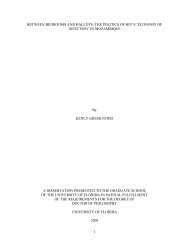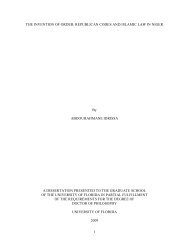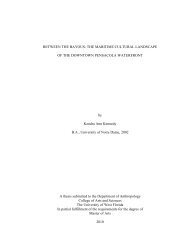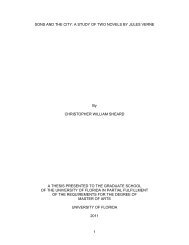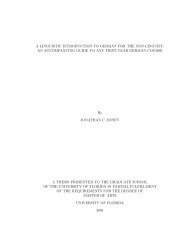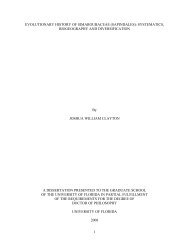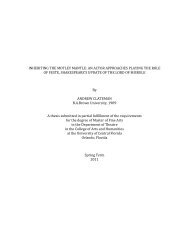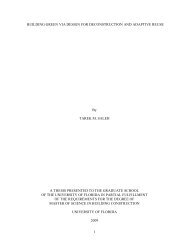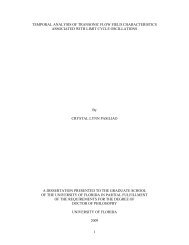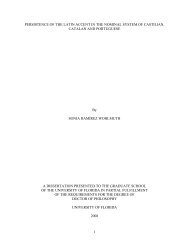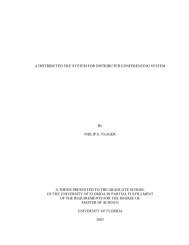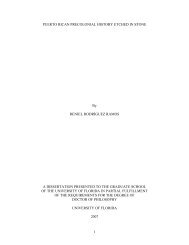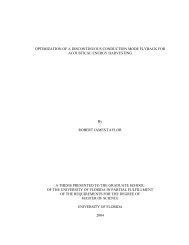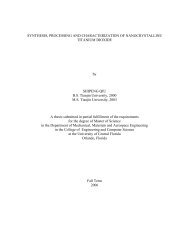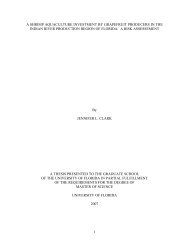Tracing the Source of the Elephant And Hippopotamus Ivory from ...
Tracing the Source of the Elephant And Hippopotamus Ivory from ...
Tracing the Source of the Elephant And Hippopotamus Ivory from ...
You also want an ePaper? Increase the reach of your titles
YUMPU automatically turns print PDFs into web optimized ePapers that Google loves.
ecause <strong>the</strong>y were subject to taxation and agreements between rulers. The tamkars <strong>of</strong><br />
Ugarit are <strong>the</strong> best example <strong>of</strong> <strong>the</strong> commercial merchant in <strong>the</strong> LBA. The title is<br />
mentioned in Ugaritic lists <strong>of</strong> pr<strong>of</strong>essions, sometimes as an <strong>of</strong>fice appointed by <strong>the</strong> king<br />
(Kuhrt 1995: 302-303; Warren 1991: 295; Snodgrass 1991: 17). In one instance a<br />
merchant, Sinaranu, was freed <strong>from</strong> taxation, possibly on account <strong>of</strong> his connection with<br />
<strong>the</strong> Aegean:<br />
Declaration <strong>of</strong> Ammistamru, King <strong>of</strong> Ugarit (RS/PRU III, 16.238:1-11)<br />
From this day, Ammištamru, son <strong>of</strong> Niqmepa, king <strong>of</strong> Ugarit, has ‘freed’ (<strong>from</strong><br />
import duty) Sinaranu, son <strong>of</strong> Sigina. As <strong>the</strong> Sun (<strong>the</strong> Hittite king) is free, he is<br />
free. His grain, his beer, his oil need not enter into <strong>the</strong> palace (for accounting).<br />
His boat is free (<strong>from</strong> duties), if his boat comes <strong>from</strong> Crete (Kabturi) (quoted in<br />
Knapp 1991: 68, see also Peltenberg 1991: 169).<br />
In a similar document a tamkar is exempted <strong>from</strong> serving in a diplomatic <strong>of</strong>fice (PRU III,<br />
105; cited by Peltenberg 1991: 167). In return for services <strong>the</strong>se state merchants received<br />
land and rations <strong>from</strong> <strong>the</strong> palace. Foreigners also operated in Ugarit as merchants,<br />
including merchants <strong>from</strong> Cyprus (Alashia) and <strong>the</strong> merchants <strong>of</strong> Ura, <strong>from</strong> a town<br />
located in Cilicia, who managed <strong>the</strong> grain shipments to Hatti on behalf <strong>of</strong> <strong>the</strong> Hittites<br />
(Kuhrt 1995: 302-303; Peltenberg 1991: 167; Zaccagnini 1977). Apparently <strong>the</strong> Hittite<br />
king was irritated with <strong>the</strong> economic independence <strong>of</strong> his merchants in Ugarit, and in an<br />
edict <strong>of</strong> Hattusili III (ruled 1275-1245/1264-1239 B.C.) curtailed <strong>the</strong> transactions <strong>of</strong> <strong>the</strong><br />
Ura merchants by forbidding <strong>the</strong>m to invest money or buy property in Ugarit. Nor could<br />
<strong>the</strong>y accept Ugaritic property as collateral in loans, claim property <strong>from</strong> past debtors, or<br />
live in Ugarit during <strong>the</strong> summer (Kuhrt 1995: 309-310). Similar royal interventions in<br />
178



